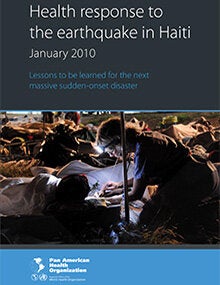The 12 January 2010 earthquake was the most devastating of many major sudden-impact natural disasters affecting Haiti in the last 10 years. The health impact of the earthquake in absolute terms (number of dead and injured) was among the highest in recent times. When the needs are compared to the country's response capacity, this disaster was truly unprecedented.
The level of response, especially in the health sector, was generous, even overwhelming. Organization of the massive, global response was challenging, and many of the problems seen in past disasters were replayed in Haiti. Information was scarce, decisions were often not evidence-based, and there were serious gaps in overall or sectoral coordination.
The book and the summaries present lessons to be learned from Haiti with the aim of improving the health sector's response in major, sudden-onset disasters in the future. It also identifies opportunities provided by the disaster for making significant changes in health services in Haiti. One of the key lessons of the Haiti tragedy is that coordination can only be effective where national authorities are equipped to assume leadership and establish relief and recovery priorities.
The publication give emphasis to those lessons that are of general interest, i.e., not specific to the case of Haiti. The international community has much to learn from the response in Haiti where it has shown an ability to repeat its errors and shortcomings from past disasters.
|

